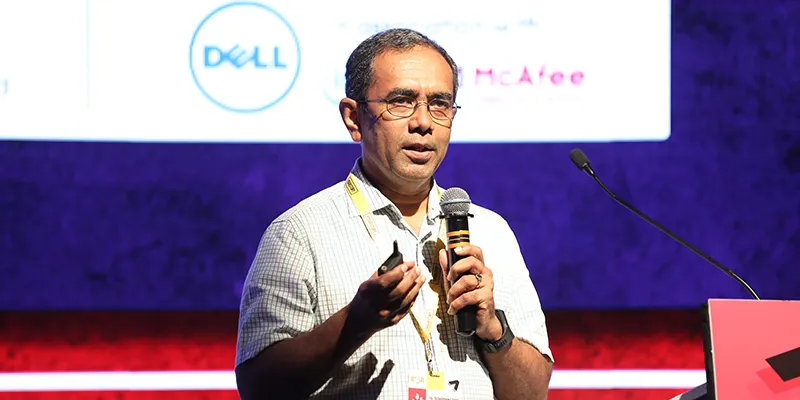[Tech30] Worxogo uses AI, behavioural science to improve employee productivity
Worxogo has developed a personal digital assistant which tracks employees' behaviour patterns and sends them daily “nudges” to improve performance.
Until about three years ago, the six founders of Worxogo - Ramesh Srinivas, Ravi Bhamidipati, Sudha Bhamidipati, Suneel Aiyer, Anant Sood, and Sivaramakrishnan - held consulting positions at PwC, KPMG, IBM, and EY. They lead, advised, and engaged with transformation programmes at various large enterprises in the IT sector, in financial services and in other industries.
They discovered that one of the key challenges faced by large corporations was on the employee performance front. Globally, over 80 percent of organisations record poor employee engagement and low productivity that adversely impacts business outcomes, according to a McKinsey report. Disengaged employees cost the US economy as much as $350 billion every year.

In India, too, the situation is somewhat similar, says Woxogo. Large workforces demand a lot of individual attention which human resources fail to offer.
So, the six consultants, who had been colleagues for decades, started testing an AI-led product that could predict employee behaviour and help these organisations guard against low productivity, and in fact, improve it.
Ramesh Srinivas, Co-founder & CEO, Worxogo, says:
“Data shows that average employee productivity is about 60 percent, and it drops for various reasons. A lot of it is due to lack of engagement and motivation. We decided to to use technology to change the behaviour of people, in this case, employees.”
They incorporated Worxogo in 2014, and launched operations in 2015. The Bengaluru startup’s first trial product was for a large sales team that, according to Ramesh, “needs day-to-day coaching”.
Worxogo uses persuasive technology (or tech that brings about change in human behaviour) and behavioural science to predict employee behaviour, and understand its correlation with performance and productivity.
Machine Learning (ML) and AI algorithms are used to analyse unique behaviour patterns, trace historical performance data, and provide employees “nudges” or actionable insights on a day-to-day basis for better performance.
Mia, a personal digital coach developed by Worxogo, helps align employee behaviour with organisation objectives and, in turn, drive greater business outcomes in the areas of revenue growth, innovation, etc.
Ramesh explains,
“The concept of a nudge came from a group of behavioural scientists. We have essentially built an AI engine that predicts employee personality depending on the nudges sent. So, it gives you an idea of how an employee behaves in a certain situation.”
Worxogo took about nine months to develop the product. During the testing phase, a lot of organisations found the “behaviour concept” interesting, but were reluctant to store employee data in a cloud. “They were ready to follow if someone else had done it, but did not want to be the first ones to use it. That was one of our initial challenges,” Ramesh reveals.

The startup’s first set of clients were illustrious names from the industry. TVS Credit tested its product with its sales team, L&T deployed it for supply chain management, and the Piramal Group used it to engage employees in innovation programmes.
Today, Worxogo claims to have about 35 enterprise customers, mostly across financial services, retail, and manufacturing. “Typically, these employ large workforces and find it difficult to provide day-to-day coaching to employees,” Ramesh says. “Now, we are getting a lot of BPO clients too,” he adds.
Worxogo says it tracks the behaviour of over 100,000 employees on its platform currently. Its proprietary AI engine sends out “a million nudges every week” and has boosted productivity by 15-25 percent. Sales have gone up by 25 percent, and costs have come down by 12X. It has even succeeded in slowing down attrition for some companies.
Ramesh says,
“Most employee management solutions look at the top or mid-tier employees. But, we start at the bottom, with what we call ‘fleet on street’ employees. They are the ones most in need of daily coaching and motivation.” This bottom-of-the-pyramid approach, he believes, is Worxogo’s differentiation.
The startup operates on a conventional Software-as-a-Service (SaaS) model. There is a one-time “deployment fee” and a “per subscriber per month” charge after that. Even though the AI engine is a standardised offering, Worxogo customises its solutions depending on the client and industry it is catering to.
Ramesh says,
“Some companies want to implement it with sales teams, while some want to increase engagement in innovation. So, we do not replace their existing systems or products. We only augment them and make the processes more effective.”
Worxogo has offices in Bengaluru, Mumbai, Chennai, and Singapore. Its clients come from India, US, Middle East, Sri Lanka, and Singapore. “Our current ambition is to scale internationally. We might get some funding for it too,” Ramesh states. He, however, refuses to divulge any revenue numbers.
In essence, Worxogo is helping organisations achieve with technology what they fail to do with HR programmes. Ramesh says, “Our AI engine is as accurate as a good reader of people. It has no presets. It learns what or how human behaviour is, and offers insights accordingly.”


![[Tech30] Worxogo uses AI, behavioural science to improve employee productivity](https://images.yourstory.com/cs/wordpress/2018/10/worxogo.png?mode=crop&crop=faces&ar=2%3A1&format=auto&w=1920&q=75)




